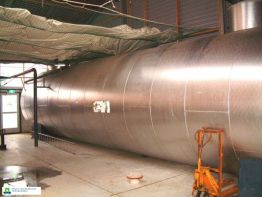Project Aim
The main aim was to enlarge the use of biomass for energy production in the North Sea countries, thus contributing to the reduction of greenhouse gases emission (Kyoto targets) and strengthening the sustainable spatial development of rural areas as well. Therefore the project brought together and expanded knowledge on the use of biomass for energy and distributed this information to relevant market parties and organisations who may use it to set up and optimise bio energy installations.
Project implementation and results
Activities
The project conducted activities investigating the incorporation of alternative and sustainable energy production strategies in order to increase the use of biomass for energy production. Among these activities was the set-up of pilot plants on biomass and wood burning as well as trials to test and demonstrate innovative technologies, processes and the use of different biomass types for the production of bio energy.
The project improved the quality of life in the North Sea Region by contributing to different field trials on how to use biomass and biogas as future energy resources, which allowed farmers to diversify their activities and, in the long run, also supported the economic development of rural areas.
Another field of activities focused on the creation of an extensive, centralised knowledge platform, on informing and educating relevant parties to increase awareness of the bio energy market and on setting up regional networks or branch offices to support the further development of the bio energy market.
Pilot projects
The Province of Fryslân, the Netherlands, the biogas co-digestion plant (manure) was running and findings fed into project. The pilot demonstrated that local bottom-up initiatives are necessary to raise awareness at higher political levels (regional and national), e.g. to initiate regulatory measures introducing general feed-in tariffs for renewable energy.
Joint transnational strategy
Bottom up approach
The project set up a Coordination group consisting of a representative from each of the regional partners with the function to set the overall strategic course of the project and guard the cross links between the themes. As representatives of the regional projects, the coordination team members also act as link between the regional projects and the overall project. Additionally, an expert group was established, which had varying composition depending on the subject. The members of the expert group again come from the regions. The aim of this set up was to be as practical as possible in managing the project.
Impact of the project
Long-term achievements
The project findings in the Netherlands will be subject for further implementation within a Dutch national government programme on processing waste materials into bio-energy; landscape maintenance combined to energy production. This was particular concerning why fermentation plants should be classed as agricultural installation to facilitate environmental friendly ways of energy production (as they are often considered to as industrial installations). |

NSBE co-digester: The project aimed to enlarge the use of biomass for energy production
Partners POM West Vlaanderen, BE
Landwirtschaftskammer Weser-Ems, DE
DLG, Government Service for Land and Water Use, NL
Forestry Commission Scotland, UK
LP:
Province of Fryslan
Project Manager
Geert Boesjes
Province of Fryslân Tweebaksmarkt 52
P.O.Box 20120 NL-8900 HM Leeuwarden
The Netherlands
g.boesjes@fryslan.nl
www.northseabioenergy.org
Tel: +31 582 925 578
Measure: 3.3
Start Date: 26 February 2004
End Date: 31 March 2008
ERDF Grant:
 2.223.053,00 2.223.053,00
Total Eligible Sum:
 4.446.106,00 4.446.106,00
|